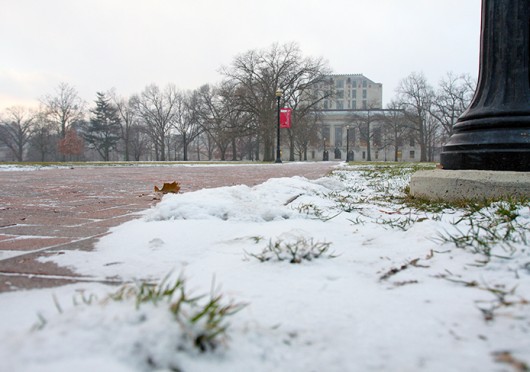
Snow blanketed the Oval, Jan. 6. OSU closed Jan. 6 and Jan. 7 because of extreme weather conditions.
Credit: Shelby Lum / Photo editor
Although Ohio State’s two-day campus shutdown forced professors to adjust their syllabi, some teachers and students said the transition went as smoothly as possible.
All six of OSU’s campuses were closed for at least two days last week because of extreme cold weather. Temperatures reached a record low of minus 9 degrees Jan. 6, according to Weather Underground.
The loss of two days had minor implications for some professors, while those teaching highly regimented courses faced larger hurdles.
Steven Kroner, physical teaching lab supervisor, greeted the extra days at the beginning of the term with enthusiasm as he spent more time with his family, he said in an email.
With one weekly lecture and two labs in his upper-level chemistry class, the first week’s activity was dependent upon the preceding lecture. In order to adapt to this complication, Kroner said he met with his students during their Thursday lab sessions “to give a shortened lecture,” still begin the activity and “not lose the whole week.”
Professor of English, anthropology and comparative studies Dorothy Noyes chose to shift her course’s introduction to Thursday and merge some of the first week’s content into next Tuesday.
“Many of us have learned to take the first two sessions gently in any case because drop-add makes the first week’s population unstable,” she said in an email. “And honestly, with the extra two days to readjust and get settled, I think everyone was better rested and in a better mood to start the semester.”
Some students, though, didn’t feel the same way.
Taylor Young, a second-year in radiology, said she thought her instructors were “cramming” before class. Young received emails from her professors requiring her to read a chapter from her textbook and take a quiz before her first day of classes.
“They wanted to make sure we were still staying on track with the original syllabus that was intended before the snow days took place,” she said.
Aside from one professor who pushed back some deadlines, the majority of her instructors made it clear they intended to stick to the original syllabus, she said.
Young said, though, she was able to use her extra time on the snow days to prepare for her classes.
Jesse Fox, an assistant professor of communication, appreciated the extra time off.
“Although it may have seemed like a setback, the days off gave me more time to prepare for the start of teaching this semester and get some more writing done,” Fox said in an email. “That bonus time actually made me more excited for class to start.”
Mark Walter, an associate professor of mechanical and aerospace engineering, said the undergraduate engineering program has rigid core classes, which require a large number of technical subjects. As a result, he said class time is imperative in order to master these subjects.
“If a particular core course does not get through the entire syllabus, then knowledge, understanding (and) skills are not in place for the next class,” Walter said in an email. “This is why we tend to be pretty strict in following the syllabus.”
Although Walter is teaching an upper-level engineering class this semester, he guessed how he would have managed the decrease in class time if he had been teaching a core course.
In order to make up for lost time he would have to “make a judgment call,” he said. “This could mean dropping a topic that is less important to subsequent classes or more likely, it would mean spending a little less time on teaching one or more topics that are not as critical for subsequent classes.”
Although the cancellations came with certain scheduling inconveniences, some students and instructors remained upbeat.
“Overall, I think students seem well-rested and more ready to go than they would have been on Monday, so I think overall a couple of snow days to start our term worked out well,” Kroner said.
More simply stated, Noyes said, “it wasn’t a disaster.”


